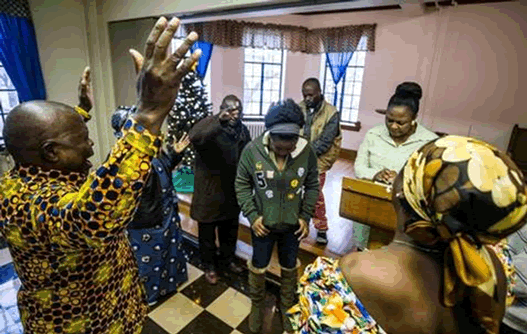 |
Ebitsibu byaghu uka birya neka yaghu. (Nande) Ukivuna shida unaila na jamii yako. (Swahili) Quand on recolte la peine, on la consomme avec sa famille. (French) When you reap problems, you share with your family. (English) |
Nande (Democratic Republic of Congo – DRC, Uganda)Proverb
Background, Meaning and Everyday Use
The Nande or Konjo are a Bantu-speaking ethnic group who speak the Nande language. The Nande live in both the Democratic Republic of Congo and the Republic of Uganda. In Congo they occupy the territory of North Kivu mainly in areas of Lubero, Beni and Butembo.
They are also known as (Oru) Ndandi and Yira in Congo. Their population in DRC is estimated to be 7.5 million. In Uganda, they are referred to as Konzo, and are led by a king mainly in the Ruwenzururu Kingdom. Their kingdom extends through four districts in Uganda, mainly Kasese, Bundibugyo, Fort Portal, Kabarole and Toroko. Their king is known as King Charles Mumbere. Their population in Uganda is estimated to be 1.5 million.
The Nande of Congo and the Konzo of Uganda are a single ethnic group known as Yira (Bayira). They trace their origins to the Ruwenzori Mountains which lie between the two countries. Their languages are too close to be considered as divergent dialects. However, Nande has a number of dialects of its own: Nande proper, Kumbule, Mate, Tangi, Sanza, Shu, Songola (Songoora, Nyangala), Swaga /Kira (in Nande, all of these are prefixed with eki-).
Shu is another language in the Nande community (Ekishukaali) formerly spoken by women (Avashukaali). It may have been a specific reference to a kind of secret jargon into which the girls and the boys were initiated. Some Nande of Congo have a patron-vassal relationship with the Efe Pygmies.
This proverb teaches mainly about the importance and value of family. Its message is a parallel to the popular society proverb “blood is thicker than water” which is used to imply that family relationships are often more important thanfriends. During times of hardship for instance, its one’s relatives who usually come to one’s rescue, not friends. The proverb therefore encourages people to maintain good family relationships among them. Granted friends are also useful in one’s life, but they will always take a second place. Family comes first. In fact, it is a common phenomenon that friends are reliable only during happy times, not during strife.
This proverb is used to:
1. Caution people who do not appreciate the value of family ties and family relationships.
2. Educate people about the importance of a strong family set-up.
3. Encourage strong family ties and relationships.
Biblical Parallels
“And do not forget to do good and to share with others, for with such sacrifices God is pleased” (Hebrews 13: 16).
“Anyone who does not provide for their relatives, and especially for their own household, has denied the faith and is worse than an unbeliever” (1 Timothy 5: 8).
“Behold, children are a heritage from the Lord, the fruit of the womb is a reward. Like arrows in the hand of a warrior, so are the children of one’s youth. Happy is the man who has his quiver full of them; they shall not be ashamed, but shall speak with their enemies in the gate” (Psalm 127: 3-5).
“Your wife will be like a fruitful vine within your house; your children will be like olive shoots around your table” (Psalm 128: 3).
“So an elder must be a person whose life is above reproach. He must be faithful to his wife. He must exercise self-control, live wisely, and have a good reputation. He must enjoy having guests in his home, and he must be able to teach. He must not be a heavy drinker or be violent. He must be gentle, not quarrelsome, and not love money. He must manage his own family well, having children who respect and obey him. For if a man cannot manage his own household, how can he take care of God’s Church?” (1 Timothy 3:2-5).
Contemporary Use and Religious Application
In recent times, family values have been severely curtailed. The family as a social and unifying setting is losing its value. Young people today seem to no longer understand the critical importance and place of marriage, family and healthy relationships in the society. This scenario has had a very adverse effect on the contemporary family status. As a consequence, the world is now witnessing a growing number of divorce cases, broken relationships, unfaithful partners and single families. Additionally, domestic violence has also become a norm the world over.
In the Nande community, a family is not only a responsibility but also a source of wealth. It is expected that a man or a woman shall leave his or her father and mother, get married, and start his or her own family. The couple and its offspring shall be united by their blood, and together, a family unit as the basic foundation of society shall become a reality. This will form the basis of any organization whereby people shall co-exist and help each other in times of need.
This proverb therefore mainly emphasizes the importance of a family living in harmony. Similarly, religion teaches about family love and what God expects us to do: live in harmony, tender love, and to relate well with our fellow brothers and sisters. The Bible emphasizes that husbands should love their wives and that on their part, wives should respect their husbands. It teaches that children should obey their parents and the elderly so that they can be blessed with long happy lives. In essence, the core lesson here is about good family ties and how religion values the family. Praying together is important. There is a universal saying: The family that prays together stays together.
Alimas Kaluta
Nairobi, Kenya
Cell phone +254715576517
Email: alimasikaluta@gmail.com
Photographs provided by:
Cephas Yao Agbemenu
Department of Fine Arts
Kenyatta University
P.O. Box 43844
Nairobi, Kenya
Cellphone: +254 723-307992
Email: cyagbemenu@yahoo.com

